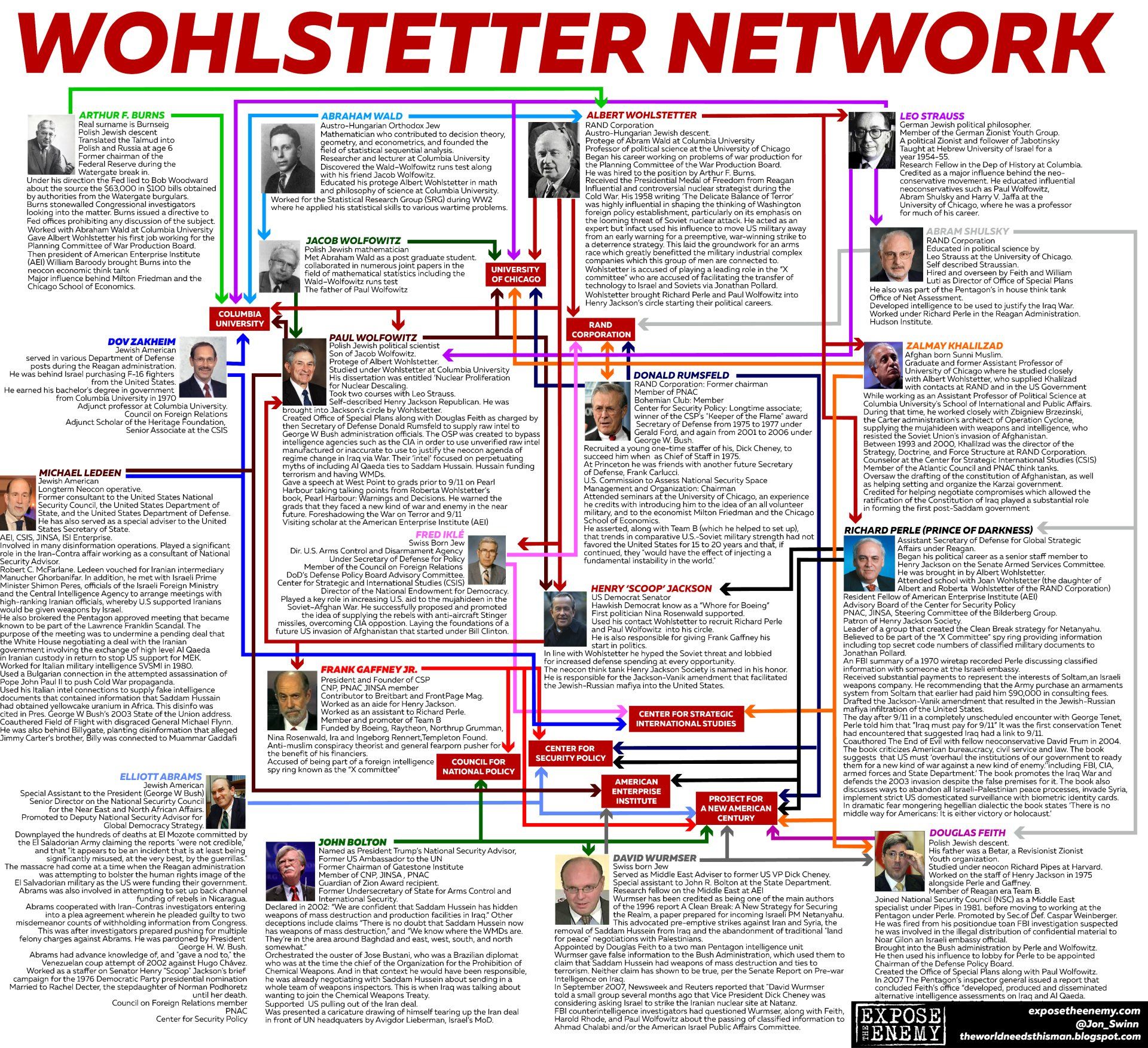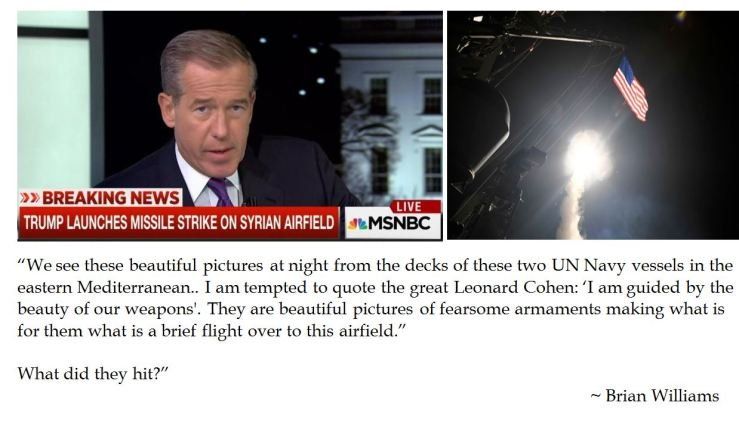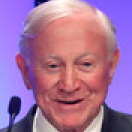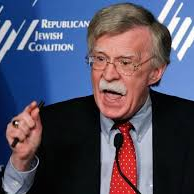Trump, war, the Pentagon and the conservative establishment
Trump and his defense-sector dominated administration are clearly salivating at the thought taking military action against Iran and North Korea (at the very least) while the mainstream media foments and reinforces this sentiment through its unremitting anti-Russian hysteria and by showering the Trump administration with praise and flattery every time it even hints at intervention or takes military action. Remember this?
The Pentagon has already bombed Syria, sent almost 4,000 additional troops to Afghanistan (with additional plans in the works to send even more troops in and give the Pentagon far broader authority to conduct operations in Afghanistan), lobbied for the creation of a “Space Corps” (reminiscent of Reagan-era SDI schemes) and more recently been dreaming up proposals to supply Ukraine with antitank missiles and other high-end weapons, which would take the US-Russia proxy war in Ukraine to a new level. However, at least in the short-term, these seem to be relatively minor agenda items compared to Iran and North Korea.
Only two months into the Trump administration, neoconservative NatSec booster and former Kissinger and Weinberger aide, K.T. McFarland (who was at that time Deputy National Security Adviser), convened a meeting of national security experts and officials to discuss potentially taking military action against North Korea – a drastic departure from previous administrations’ North Korea strategy. Despite the fact that the more diplomatically inclined H.R. McMaster and Dina Powell have replaced Flynn and McFarland at the National Security Council, the tone on North Korea hasn’t changed in the slightest and the NSC and Pentagon continue to prepare military options against North Korea and, as far as anyone knows, has not pushed back against the president or any of his cabinet members’ inflammatory pro-war intimations. Of course, the media is complicit with North Korea and the White House in this escalation, as it has hyped the North Korean threat by obsessively and ceaselessly theorizing and speculating as to which American cities North Korea can hit with ICBMs.
On the Iran front, things don’t appear to be any better despite the fact that the media has not been giving it as much attention as Korea. Iran has long been a target of the West due to 1) the fact that it’s the only Middle Eastern country with any semblance of a native defense industry that isn’t reliant on the US for parts, maintenance and engineering and 2) Israel’s wish that Iran be wiped off the map since it is the only real long-term cultural, military and economic threat to its intended complete dominance of the Middle East. Trump, McMaster, Tillerson and extreme Iran-hawk Mattis are actively scheming to sabotage the Iran “deal” (which was almost certainly a carefully designed trap from the beginning) by finding a way to declare than Iran is technically in noncompliance with the deal, thereby setting the stage for a military confrontation. This is of course the exact same course of action that the Bush II administration took in the run-up to the Iraq War.
Even absent drastic acts of foreign intervention, the Pentagon will surely remain happy throughout the Trump administration, as it has made it blatantly obvious that it wishes to drastically expand the Department of Defense in regards to both its size and scope by lifting caps on spending and has deliberately sidelined (to the extent it can) the National Security Council and empowered the Pentagon (as well as the CIA) to make national security and military decisions more independently and absent White House meddling. This shift of power from the NSC to the Pentagon and the resulting streamlining of military decisions is perhaps the most consequential and significant aspect of the Trump presidency, yet it hardly receives any coverage at all.
…the presidential candidate who termed our military a “disaster�? and insisted that huge spending increases were needed to bring it back up to par. A window into this Trump’s thinking can be found in a speech he gave in Philadelphia in early September. Drawing heavily on a military spending blueprint created by Washington’s right-wing Heritage Foundation, Trump called for tens of thousands of additional troops; a Navy of 350 ships (the current goal is 308); a significantly larger Air Force; an anti-missile, space-based Star Wars-style program of Reaganesque proportions; and an acceleration of the Pentagon’s $1 trillion “modernization�? program for the nuclear arsenal (now considered a three-decade-long project).
Todd Harrison of the Center for Strategic and International Studies estimates that, if Trump faithfully follows the Heritage Foundation’s proposal, he could add more than $900 billion to the Pentagon’s budget over the next decade. Trump asserts that he would counterbalance this spending splurge with corresponding cuts in government waste but has as yet offered no credible plan for doing so (because, of course, there isn’t one).
You won’t be surprised to learn, then, that the defense industry, always sensitive to the vibes of presidential candidates, has been popping the champagne corks in the wake of Trump’s victory. The prospects are clear: A new Pentagon spending binge is on the horizon. – Mother Jones
This is without a doubt the reason why the largely Pentagon and CIA based conservative national security-booster establishment thrust Trump into office. The primary architect of this putsch was likely former CIA director James Woolsey, the most connected neoconservative Zionist in the world who features prominently on many NGO advisory boards (including many run by the liberal diplomatic establishment ), has served on the board of nearly every major defense company under the sun and has remained a consummate Pentagon insider his entire career. Woolsey likely accomplished this through using renegade boyscout Michael Flynn as his proxy. Woolsey developed a close relationship with Flynn throughout the 2016 election season and into Flynn’s tenure as National Security Advisor – Woolsey served as an advisor to the Trump presidential campaign as well as a board member of Flynn Intel Group, attended a meeting alongside Flynn with Turkish government officials about covertly capturing Fethullah Gulen and sending him back to Turkey and was even offered the position of CIA director (again) by Flynn.










